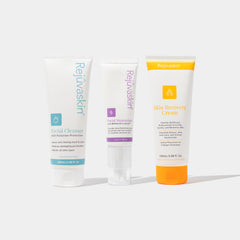Choosing the right cream or gel to diminish the intensity of your scars can be hard. Parsing through long lists of ingredients, reading testimonials, and trying different products is an arduous and time-consuming process. Thankfully, there are ways to make sense of the ingredients and what they do to benefit the effectiveness of the cream or gel. It can also be helpful to ask yourself what you are looking for out of a scar cream, and then take two products and compare their ingredients.
Let’s take a look at two popular scar-product brands: Rejuvaskin and Kelocote, and compare what each formula brings to the table. All discussions about scar removal begin and end with silicone, so let’s look at that. But first, we must examine what a scar is and how it is formed.
How Scars Are Formed
After a cut or surgical incision, the wound closes and a scar begins to form. As your skin heals itself, excessive water loss can occur for up to two years. This water loss causes dehydration in the skin and informs the surrounding cells to produce collagen. This is the body’s way of combatting dehydration. The more water loss that occurs from a wound, the more collagen is produced. Collagen is what scars are made out of. When too much collagen is produced, a raised scar appears. This thickened scar can turn in to a keloid scar if left untreated.
Silicone
Silicone is the gold standard for scar treatment. When a silicone sheet or silicone scar gel is applied to this raised keloid scar, it stops the water loss and collagen production that lead to large, conspicuous scars. Silicone will prevent the scar from thickening and rising. This results in a flatter, softer, and less noticeable scar. Silicone sheets and gels also help protect against bacterial infections. It can work on even the oldest and most severe scars.
Rejuvasil: contains silicone
Scar Esthetique: contains silicone
Kelocote Advanced Scar Formula: contains silicone
Vitamin C
It is no secret that Vitamin C is a wonder ingredient. Vitamin C is an anti-oxidant and the number of ways it benefits your body is astonishing. In addition to helping your body grow stronger connective tissue, bones, and blood vessels, it also helps treat skin. Vitamin C is often used to lighten unwanted dark spots and sun damage on the skin. In this same way it helps with the discoloration of scars.
Rejuvasil: contains Vitamin C
Kelocote Advanced Scar Formula: does not contain Vitamin C.
Emu Oil
Emu Oil is an all-natural ingredient often used in skincare products. It contains lipids similar to those on the surface of the skin. This allows the ingredient to be easily absorbed in to the skin. Once absorbed, Emu Oil is a powerful moisturizer.It also has anti-inflammatory properties that can help smooth the skin and help relieve inflammation.
Rejuvasil: contains Emu Oil
Kelocote Advanced Scar Formula: does not contain Emu Oil
Squalane
Squalane is an all-natural ingredient derived from plants. Many scar creams only contain silicone and leave a sticky residue on your skin. This stickiness can stay on all day, and may be uncomfortable. Squalane helps to moisturize the skin which helps get rid of that sticky feeling. That means, you can treat your scars and your skin feels normal as you go about your day.
Rejuvasil: contains Squalane
Kelocote Advanced Scar Formula: does not contain Squalane.
Verdict
Hopefully, this comparison was helpful. Both creams contain the silicone necessary for scar healing, but Rejuvaskin’s natural elements help the cream or gel dissolve comfortably, and contain the Vitamin C to diminish the dark spotting of scars.





















Leave a comment